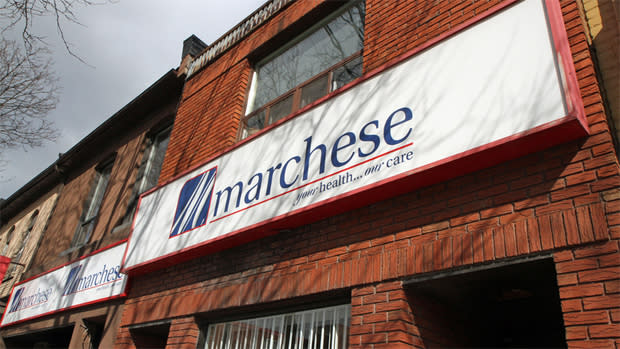Hamilton company in chemotherapy investigation known for local philanthropy

A Hamilton company came under intense national scrutiny this week after it was revealed almost 1,200 cancer patients were given watered down chemotherapy drugs that were prepared in its lab.
The case has spurred Ontario premier Kathleen Wynne to call for an independent investigation to uncover what exactly transpired. And two law firms are preparing a class action suit against the business on behalf of affected patients and their families.
Related: Premier calls for investigation into watered down cancer drugs
In its hometown, though, Marchese Health Care, which began as a family-run pharmacy in 1961, is a well-regarded fixture of Hamilton's downtown. Marchese, as well as current president and CEO Marita Zaffiro, have a local reputation for philanthropy.
“I can assure you that the Marchese pharmacy and the Marchese name is one that speaks volumes in terms community involvement,” said Ward 4 councillor Sam Merulla, who grew up in Hamilton's lower city. “Their contribution in the community is second to no one.”
Marchese's website states that “giving back to the community” is a key part of the company's mandate. Each year, its social committee “gives thousands of dollars in employee payroll contributions, in-kind donations and volunteer hours to dozens of charitable causes.”
In 2011, the firm marked its 50th anniversary by establishing the Marchese Health Care Legacy Fund to provide grants to local community groups. The first recipient was YWCA Hamilton, which received $2,500 to develop a business plan for a future not-for-profit café.
“We're always very grateful when we get support for the work that we do,” said Denise Doyle, CEO for YWCA Hamilton. “Marchese pharmacy has been a very generous contributor to organizations in the community.”
Additionally, Marchese has devoted much of its charitable giving to local health care organizations. The company has donated more than $20,000 to the St. Joseph's Hospital Foundation, according to Carrie Trembinski, a spokesperson for the charity.
Last year, Marchese donated between $1,000 and $4,999 to Hamilton Health Sciences (HHS), according to the hospital network's most recent donor report. (Citing privacy concerns, HHS would not disclose precise dollar amounts.)
Zaffiro herself has been lauded for her charity work. She won a Queen Elizabeth II Diamond Jubilee medal this year and was named Hamilton's Distinguished Citizen of the Year in 1998.
And Zaffiro, who took over Marchese from its original owner in 1988, is the current treasurer for the Hamilton Community Foundation, an organization that co-ordinates charitable giving in the city.
According to Cancer Care Ontario, patients in Oshawa, Peterborough, London and Windsor were given doses of cyclophosphamide, used to treat diseases including breast cancer and non-Hodgkin's lymphoma, that had been mixed with too much saline solution.
A representative from Horizon Health Network in the Saint John area of New Brunswick said as many as 186 of its cancer patients had received watered down chemotherapy treatments since March 2012.
The premixed bags of a chemotherapy drug and saline solution were prepared by Marchese, Cancer Care Ontario said. The supplier produces and labels these medications.
"Our understanding from the hospitals is this drug may have been to 20 per cent under the dose expected," Dr. Carol Sawka, vice-president of clinical operations at Cancer Care Ontario, said in an interview with CBC News.
"Hypothetically, one would imagine if only one dose was delivered at three per cent less than intended of a 12-dose regimen, it would be very unlikely to have any impact, but it is difficult to speculate beyond that because of the unique circumstances of each patient."
The overall impact on patients is likely low, said Dr. Ken Schneider, chief of oncology at Windsor Regional Hospital, one of the institutions that received the diluted drugs.
CBC Hamilton made several attempts to contact Marchese Health Care and Zaffiro for this article. A spokesman for the Marchese said the company wouldn't comment, and Zaffiro didn't return a reporter's phone calls.
However, in a statement posted to Marchese's website on Wednesday, Zaffiro said the company is not at fault for the drug dilutions and that the errors “were the result of the use of our preparation” and not the product itself.
“We are confident that we fully met all of the contract requirements including both volume and concentrations for these solutions.”
Councillor Merulla wouldn't comment specifically on what's been reported in the media, but he said, “I'm sure there is an explanation for all of it.”

